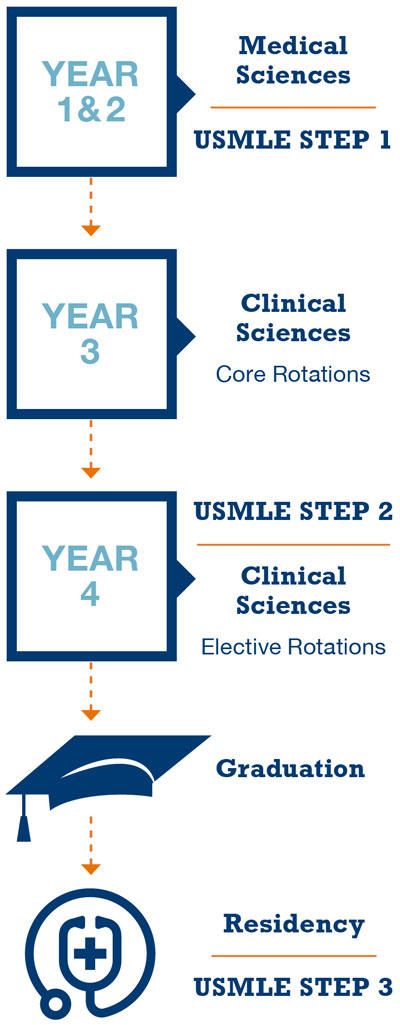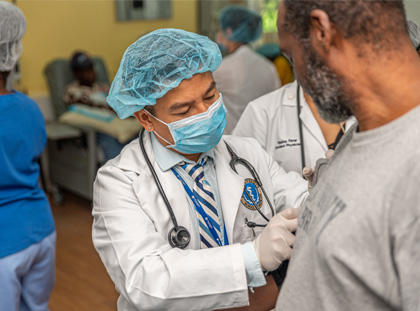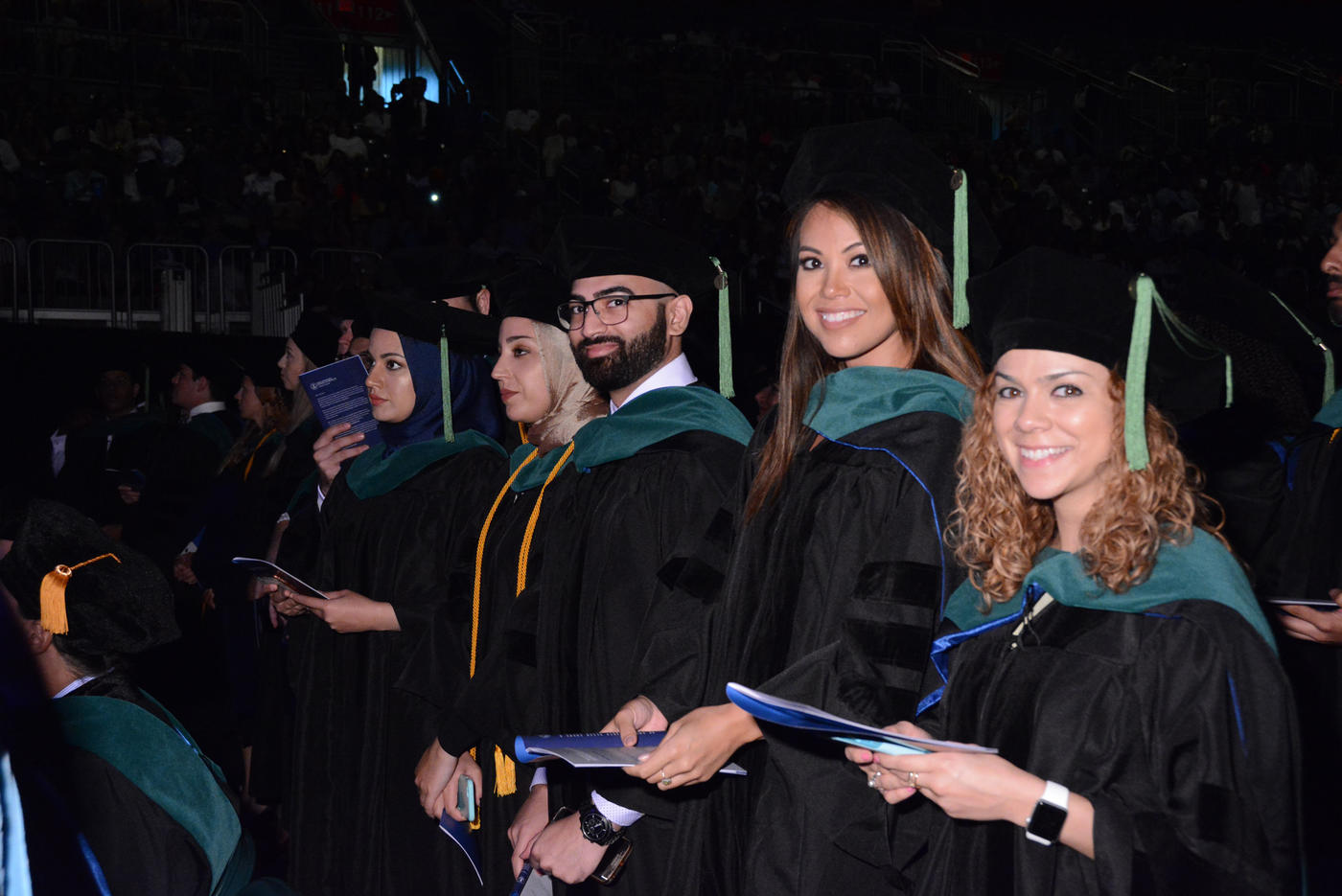As you survey the challenges that lie ahead in your medical school journey, thinking about taking the United States Medical Licensing Examinations (USMLE®) might produce lots of anxiety. All the medical terms to memorize, diagnoses to understand and symptoms to analyze will play a huge role in your future life as a physician. In fact, wondering how to begin might create the most anticipatory stress. Crafting a solid plan of action with study resources to help you master the exam content can help you feel more prepared to tackle your USMLE exams. First, it’s important to learn what’s included in each exam to study effectively. Next, you’ll want to start preparing your pre-dedicated study period by creating a study timeline and study strategy with the help of the Academy for Teaching and Learning (ATL). The Ross University School of Medicine (RUSM) ATL faculty will provide an invaluable source of information and individualized support to help you navigate your preparation for each USMLE examination. Having the academic support and knowledge to successfully pass each step can help relieve your USMLE test-related anxiety.
What is included on each USMLE exam?
The USMLE is a three-step examination for medical licensure in the U.S. The exams assess the ability to apply knowledge, concepts, and principles that are the basis of safe and effective patient care.
Step 1 is approximately eight hours long and consists of seven blocks of 60 minutes with up to 40 questions per block on basic science disciplines including: Anatomy, Embryology, Histology, Cell Biology, Behavioral Science, Biochemistry, Microbiology, Pathology, Pharmacology, and Physiology, as well as Genetics, Immunology, and Nutrition. USMLE Step 1 is considered the most difficult exam and is usually taken after the second year of medical school. As of January 26, 2022, this exam will become a pass-fail examination.
Step 2 CK Step 2 CK assesses an examinee’s ability to apply medical knowledge, skills, and understanding of clinical science essential for the provision of patient care under supervision and includes emphasis on health promotion and disease prevention. Step 2 CK ensures that due attention is devoted to principles of clinical sciences and basic patient-centered skills that provide the foundation for the safe and competent practice of medicine under supervision. Test questions focus on the principles of clinical science that are deemed important for the practice of medicine under supervision in postgraduate training. A nine-hour, one-day exam, consists of eight blocks of 60 minutes with up to 40 questions per block. The exam is organized by physician task and disease category. Most students take this exam in their fourth year of medical school.
Step 3 tests the application of medical knowledge and the understanding of biomedical and clinical science, emphasizing independent patient management in ambulatory settings. It’s the final exam leading to a license to practice medicine. Step 3 is a two-day exam and consists of 232 multiple-choice items, lasting approximately seven hours the first day. Day 2 has approximately nine hours in the test session, with 180 multiple-choice questions and 13 case-simulations. RUSM students do not need to take Step 3 before residency matching unless they are a non-U.S. citizen.
USMLE Timeline
Changes to the USMLE steps
In 2020, the Federation of State Medical Boards (FSMB) and the National Board of Medical Examiners (NBME) announced the following changes:
- The Step 1 Exam will be changed to pass/fail grading (to be implemented January 26, 2022).
- The number of examination attempts for each exam will be reduced from 6 to 4 (to be implemented July 1, 2021).
- Changes in the question pattern will now include questions on “soft skills” in a clinical setting (implemented in October 2020).
In 2021, additional changes were introduced:
- The Step 2 Clinical Skills (CS) exam was cancelled, however the Step 2 Clinical Knowledge (CK) exam was retained.
What is the reasoning behind the USMLE exam changes?
The decision by the USMLE program to change score reporting for Step 1 from a three-digit numeric score to pass/fail reporting was made to remove the emphasis on scores, support engagement and improve the overall experience for medical students. In addition, the USMLE attempt limit policy was changed to protect the integrity of the exam and match the USMLE attempt limits imposed by state medical boards in most states. Students must pass Step 1 to move on to the third year of medical school.
A major change to the USMLE examination process is the permanent CS portion of the Step 2 exam. The decision to remove the Step 2 CS passes on the responsibility of assessing clinical skills to medical schools.
The National Board of Medical Examiners® (NBME®) decided to change the Step 1 and Step 2 CK exam questions to feature communication and interpersonal skills, often referred to as “bedside manner”. The new questions will include patient safety and legal/ethical skills. These type of exam questions highlight the importance of patient rapport and empathy, helping prepare medical students to offer the highest-quality patient care as physicians.
RUSM Academy for Teaching and Learning (ATL) faculty keeps students updated on how the recent USMLE exam changes will impact them and what they’ll need to know to be successful.
What is the rational for the changes to the USMLE?
Sean Gnecco, MD, Associate Professor of Family Medicine, Director, Clinical Academy for Teaching and Learning (CATL)
The USMLE Step 2 CS exam assessed the application of clinical knowledge in the context of simulated patient care. Each student had to obtain a patient-centered history and physical exam from 12 simulated patients, counsel them based on their diagnostic impression, and then write a patient note. These are essential skills for safe and effective patient care that all graduates must possess before entering residency. The responsibility will now be placed on individual medical schools to demonstrate that each graduate has the clinical skills and competency. At RUSM we use a combination of a evaluation from core clinical clerkships and a simulated patient examination called the Clinical Skills Assessment (CSA) which is objective and structured to assess these skills. RUSM ATL faculty will help students prepare for this assessment which is usually completed between the third and fourth year and consists of six simulated patient cases.
How will the USMLE exam changes affect residency?
Dr. Kashif Ahmad, Associate Dean, Academic Learning Environment (ALE)
We don’t know exactly how residency program directors are going to change their approach to screening students. The way it will affect RUSM students is, for International students to be eligible to match, they must pass Step 1. They’ll need to have passed Step 2-CK with good scores. Step 1 going pass/fail does not mean that one has to prepare less, it is still a milestone that has to be achieved. Students may want to take that exam in the Fall of the year they’re going to match. Interpersonal skills, networking, letter of recommendations and Medical Student Performance Evaluation (MSPE) could increase in value now that Step 1 is changing to pass/fail, but we have to see how outcomes are affected with a change in policies. This is considered a positive change as most schools are striving to embrace a competency based medical education.
How does RUSM help students prepare for the USMLE exams?
Courisse Knight, MD, Director, ATL
We have formative assessments throughout the curriculum, with patient-focused cases that allow students to apply basic science knowledge to clinical knowledge. At the same time, we’ve included bioethics and behavioral sciences into these cases. We’re trying to change the student mindset around what medical knowledge is—it’s the skills, but also how you approach the patient.
RUSM helps students focus on preparation for the USMLE exams from Day 1. We help students track their competency progress as well as plan the steps to prepare. We have progress testing, which gives students exposure to how they’re performing in different disciplines. So, students are alerted to gaps in their knowledge and also learn how to plan to master the exams. In addition to this, we take a holistic approach to address the stress of the exams and help students manage a stressful term in addition to staying on track to prepare for successful exams.
Dr. Kashif Ahmad, Associate Dean, ALE
We have our own standardization of skills assessment at RUSM and we work with Kaplan’s clinical skills assessment. The artificial categories of the Step 2-CS and assessment tools means students can benefit from the more realistic assessment of their clinical skills and we can identify deficiencies before their 4th year. We make sure that our students are competitive when they are in front of a residency director. This is achieved by the phenomenal work in our Med Ed, Medical Sciences, Clinical Sciences and Office of Career Attainment (OCA) departments. We at the ALE work collaboratively with students to meet their specific needs. In addition, The RUSM curriculum affords students lots of opportunities to explore their interests and practice their skills before residency. Plus, we have more personalized attention built into our curriculum.
We’ve introduced an 8-week comprehensive review program which focuses on Step 1, called “The Step 1 Rapid Synthesis Program.” The program reviews topics that are difficult to understand and need more in-depth study. Then, we offer advising, working closely with students. We also offer the Comprehensive Basic Science Examination (CBSE), a scored test administered by the NBME, to gauge where students are in terms of performance.
Once we supply these study aids, students have everything they need at RUSM to obtain support. We provide the most popular tools to prepare for Step 1, for example, free access to UWorld question banks for one year. The UWorld score is one of best predictors of a student’s USMLE exam score and is used by most medical schools as a tool to assist students.
The most important thing for students to realize is the change to pass/fail does not mean they should lessen their effort in preparing for the exam. Because there are some unknowns around what is considered a “Pass”, students should prepare the same way as they normally would.
Also, students should take studies seriously around their knowledge of clinical sciences. Because of the change, residency directors may rely on the Step 2-CK score as a qualifier for residency. The good news is the focus is on a competency-based education, and doctors will be trained to have good interpersonal skills, be aware of the legal aspects and can work in health systems.
Students should not waste money on different tools for exam prep. Our staff can advise students on which tools to use and how to use them properly.
RUSM is focused on looking at interprofessional education and concentrating on those skills. This is how the RUSM curriculum helps students with core topics like patient care and occupational safety, beyond the core curriculum. Our students will know how to work with nurses, respiratory therapists and other medical staff as we revamp our Interprofessional Education (IPE) curriculum. I think residency directors will recognize the value in candidates who’ve completed this type of education, that also fulfills some of the Entrustable Professional Activities (EPA) requirements for our students.
Dr. Knight:
RUSM offers a pre-matriculation course that introduces students to some foundational knowledge and skills students need for medical school. After every mini-exam, we give performance feedback. In addition, an extensive orientation is presented at the beginning of the semester. The best advice is to take advantage of the opportunities for advising offered by the ATL. The RUSM curriculum will help students to learn about themselves as a learner, for example, how they process information. Students need to learn what they need to process knowledge effectively.
The ATL customizes a plan for each student, helping them to set goals. It’s especially important for non-traditional learners who may have been out of school for a few years. The ATL doesn’t take student success for granted—we’re here to support students. We think this personalized approach can help every student be successful. That’s the RUSM difference.
See the list of useful tools and resources below to help you begin your USMLE test prep and get started on your path to exam success.
USMLE Study Resources
RUSM Campus Resources
- RUSM Counseling & Wellness Center : Ross University School of Medicine’s Counseling Center services are free and confidential. We are available to address personal, academic, and mental health concerns of RUSM students.
Barbados Campus Health Services
Email: rusmcounseling@rossu.edu
Phone: 954-885-3627 Monday-Friday, between the hours of 8:00 am-5:00 pm (Standard Time)
Miramar Clinical Campuses
Email: mmejia@rossu.edu
Phone: 754-208-4706 Monday-Friday, between the hours of 8:00 am-8:00 pm (Standard Time)
To learn more about tools available for USMLE preparation, contact the RUSM ATL at ATL@RossU.edu. Admissions associates can answer any questions about advising and admissions at RUSM. You can reach the Office of Admissions at 855-637-6778 or email admissions@rossu.edu.





